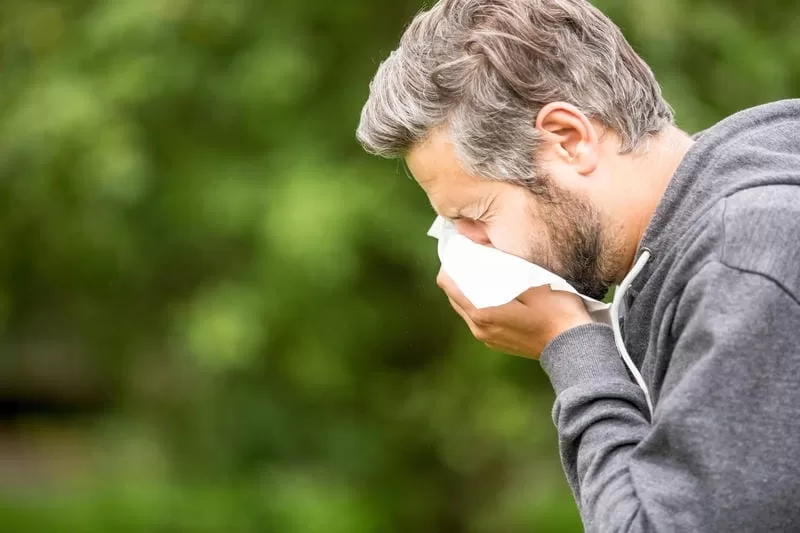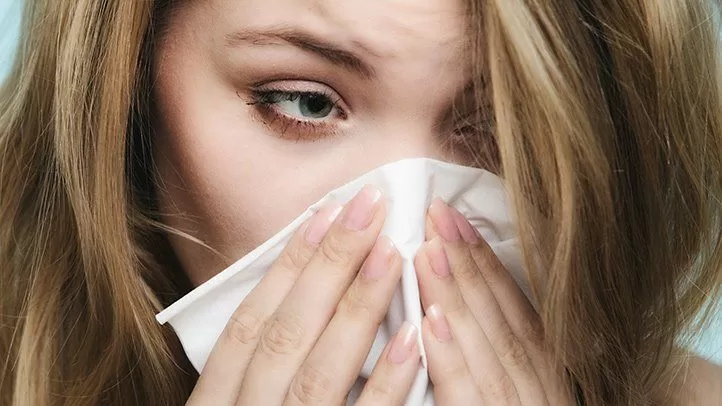It makes sense to look for allergy treatments to get rid of symptoms since they can have a big effect on the quality of life. But before you try a home remedy, you should talk to your doctor about it, since some of them can cause serious problems. Pollen from trees, grass, flowers, and weeds can trigger allergic reactions in some people during certain times of the year.
Sneezing, itchy or watery eyes, irritated skin, and even hives might result from contact with any of these pollens. Many of these symptoms can be stopped or made less bothersome by taking allergy medicine. You should never alter your dosage or stop taking any allergy medication without first consulting with your doctor.
The various all-natural treatments available for allergies are discussed in this article. What the studies have found, how these treatments work, and any potential drawbacks are all discussed.

Allergic manifestations
Allergy sufferers have a complicated connection with spring. It’s hard to enjoy the outdoors and appreciate the flowers when you have a stuffy or runny nose. Even when the birds are chirping, your sinuses are demanding attention.
OTC antihistamines are commonly used to alleviate allergy symptoms. When a person is exposed to an allergen, their immune system releases the chemical histamine. Histamine can cause many uncomfortable symptoms, such as a runny nose, watery eyes, itching, and swelling. It makes sense to rely on antihistamines to alleviate the sniffles, but there are drawbacks to using such medications, including drowsiness, lethargy, headaches, and nausea.
When people use nasal corticosteroids, they sometimes experience side effects such as dryness and irritation.
As a result, many allergy patients seek alternative treatments such as immunotherapy, dietary changes, and herbal remedies. But not all homeopathic remedies work, and individual responses to remedies vary widely. Before trying any of these methods, see your doctor.
If you aren’t sure what to discuss with your doctor about your allergies, we’ve compiled a list of the most reliable and well-studied natural therapies available so you can get started on the road to recovery.
Doctor-prescribed medications
Getting the right dose of one of these medications requires a visit to an allergist. Studies have shown that if you take these treatments in the right amounts, they can greatly reduce (or even get rid of) your sensitivity to allergens and help you feel better for a long time. Please take note that these are not drugs.
Treatment for Allergies Through Shots (Subcutaneous Immunotherapy)
SCIT, or subcutaneous immunotherapy, is similar to a vaccine in its efficacy. It’s a sort of exposure therapy that gradually exposes patients to their allergen until they get desensitized to it. An allergist may give a sub-allergic dose of ragweed pollen to a patient with a ragweed allergy. This is usually done in the upper arm. At this point, your immune system starts making antibodies to stop symptoms from showing up.
During the first part of SCIT, the patient gets these injections from their doctor once a week to three times a week. As the patient’s tolerance increases, the doctor will raise the dosage. In the second phase of SCIT, the patient sees the doctor once a month for three to five years. It’s not easy to commit to, but patients who do well and complete their visits might find tremendous relief that lasts for years.
Medicines for Allergic Rhinitis and Other Nasal Allergies
If you have a strong fear of needles, SCIT might not be the best choice. In addition, some people don’t like the hassle of having to visit their allergist so frequently, and others have problems with the swelling and itching that can develop at the injection site.
Sublingual immunotherapy (SLIT), thankfully, is a strategy that can deal with many of these problems. Instead of getting a monthly prick in the arm, you’ll be given drops or tablets to take daily, much like a vitamin, as a type of desensitization.
Studies show that when it comes to reducing allergic reactions, SLIT is just as beneficial as SCIT.
Four allergy tablet medications are currently licensed by the U.S. Food and Drug Administration (FDA) to treat five different types of northern grass pollen, timothy grass pollen, short ragweed, and dust mite allergies. Before liquid products can be put on the market, more research needs to be done to make sure they are safe and work well. However, they are being used off-label by some doctors.
Remedies that you can follow at home
Herbal remedies and other homeopathic treatments have not been shown to be effective in eliminating allergies, but there is some evidence that they can reduce symptoms like inflammation.
1. Butterbur
The plant known as butterbur thrives in damp, swampy environments. Many people have found relief from migraines after taking butterbur extract. And some research suggests that butterbur can help ease the symptoms of hay fever (allergic rhinitis). Butterbur tablets were found to be as effective as oral antihistamines.
Butterbur, or Petasites hybridus, is an herb that is found in northern Asia, Europe, and some regions of North America. Herbalists have used extracts from the plant to treat a wide range of ailments, including asthma, hay fever, allergies, and coughs.
Studies have shown that butterbur root or leaf extracts may help treat allergic rhinitis, according to the National Center for Complementary and Integrative Health. Asthma and allergic skin reactions are two conditions where it has not been shown to be helpful.
Butterbur extracts on the market come either from the plant’s roots or leaves. They can be swallowed as a tablet or capsule. In most cases, the supplement is taken for a week or longer, and especially during allergy season, it is taken two to four times a day.
Butterbur can cause gastrointestinal distress, headache, lethargy, nausea, vomiting, diarrhea, and sleepiness. Butterbur belongs to the same plant family People who are allergic to ragweed, marigolds, daisies, or chrysanthemums should stay away from butterbur and products that contain it.
Butterbur should never be consumed unprocessed in any form, including tea, extract, or capsule. Because it has pyrrolizidine alkaloids that can cause cancer, it could be bad for the liver and lungs. Butterbur should not be taken by pregnant or nursing women, children, or anybody with a kidney or liver illness.
2. Quercetin
As an antioxidant, quercetin protects cells from destruction. Particularly in the skin, it decreases inflammatory cells and proteins. apple skins, berries, red grapes, red onions, capers, and black tea all contain it naturally. It’s also sold as a nutritional supplement.
Many people find relief from their asthma, eczema, and allergic rhinitis symptoms when they take this.
Histamine is a substance that is released by cells after an allergic reaction, and quercetin has been shown to help limit this release in the lab. The production of IgE antibodies, another part of the allergic reaction, can also be stifled by this. Cromolyn sodium, a common antihistamine, is chemically related to quercetin.
Quercetin may be useful in the future treatment of allergies and asthma. So far, though, there haven’t been any clinical trials with people, and most research has been done in the lab or on animals. Research shows that it may help people with atopic dermatitis and other skin allergies.
The antioxidant quercetin can be found in a wide variety of foods. Supplemental tablets and capsules containing quercetin can be purchased as well. To treat allergies and hay fever, take 200–400 milligrams (mg) three times daily.
People who are pregnant or nursing, as well as those who have kidney illnesses, should stay away from quercetin.
3. EFAs (Omega-3)
Essential fatty acids include omega-3s. These are essential fatty acids. Your body needs them, but it can’t make them on its own. Fish, walnuts, vegetable oil, flax seeds, and green leafy vegetables are good sources of omega-3 fatty acids.
Omega-3 fatty acids may help ease allergy and asthma symptoms by stopping the body from making inflammatory molecules, according to new research.
There is evidence that taking omega-3 fatty acid supplements can help reduce asthma and atopic dermatitis symptoms. Human studies are lacking, however, and most research is done either on animal models or in test tubes.
Pregnant women who use omega-3 fish oil supplements may have offspring who are less likely to develop food allergies and atopic dermatitis. Positive results have been observed; however, this study is still in its infancy.
Indigestion and a fishy aftertaste are two potential negative effects of fish oil. The “blood-thinning” impact of fish oil is very slight. Do not take fish oil if you are on Coumadin; (warfarin) or heparin, or if you have a history of bleeding disorders. You shouldn’t take fish oil for at least two weeks before or after surgery.
4. Stinging Nettle

An herb called stinging nettle (Urtica dioica) has been shown to alleviate allergic rhinitis symptoms. Some people believe that this herb is the most beneficial for calming allergy symptoms.
Stinging nettle was reported to alleviate allergy symptoms in one human-randomized, double-blind clinical experiment.
In terms of clinical metrics, things like nasal smear eosinophil (a white blood cell associated with allergic responses) counts changed.
The leaves of the stinging nettle plant are brewed into a soothing beverage. Several allergy supplements contain extracts.
As a diuretic, stinging nettle stimulates the kidneys to produce more urine. Using it without first talking to your doctor is not recommended, especially if you are also taking diuretics to treat fluid retention.
5. In-Situ Honey
Raw honey naturally has small amounts of pollen in it, so many people who are sensitive to pollen think that eating honey from their area on a regular basis can help them deal with their allergy symptoms. However, its usefulness may be overstated.
Her usual answer is, “Bees don’t collect honey at a time that fits with allergies,” but she does admit that “in small amounts, it might help with mild allergies.” Therefore, by the time [the honey] is collected and delivered to us, it is already out of season for us.
According to the American College of Allergy, Asthma, and Immunology, the pollen that causes allergies is typically found on trees, grasses, and weeds, but not in honey. Honey is more of a treat than a cure if you suffer from severe allergies.
6. Nasal Washing
While nasal rinses won’t cure your allergies, they can ease the symptoms like sneezing and stuffiness for a little while.
A Neti Pot
When used as directed, the traditional neti pot is a good way to clear the nasal passages of excess mucus and other debris. To make your own saltwater solution, simply fill it with warm water (preferably distilled or sterile) and salt. When pouring the solution into your nostrils, tilt your head to one side over the sink. It’s a bit untidy, but it could work. You can also use a nasal squeeze bottle as an alternative to a neti pot.
7. Irrigating the Násal Cavity with Návage
If you’re looking for a cleaner nasal cleanser, a Nävage nasal cleanser might be a good option. This device “pulls” saline solution through one nostril, across the back of the nose, and out the other nostril to flush the nasal passages and collect any debris.
Nose irrigation should be done with anything other than distilled or heated water. Cases of amoeba infection have been linked to nasal irrigation using unfiltered tap water. 4 After each use, make sure to wipe down the tool.
It’s best to give yourself at least an hour to relax and wind down after nasal irrigation before going to bed. That guarantees the saline has drained out of your sinuses entirely and helps keep you from coughing.
8. Calcium D-Phosphate
Some allergic reactions, like hay fever, asthma, eczema, and even anaphylaxis, have been linked to not getting enough vitamin D. This vitamin helps control immune system cells and the release of chemicals that can cause allergic reactions.
Taking vitamin D3 supplements has been shown in a number of studies to reduce swelling and allergic reactions. Patients with vitamin D deficiency who used antihistamines for eight weeks also took vitamin D supplements, and their allergy symptoms improved.
On the other hand, vitamin D supplements alone haven’t been shown to be as effective. Also, it’s not clear if people who already have enough vitamin D would benefit from taking a supplement.
Another study found that people with the right amount of vitamin D responded better to allergy immunotherapy (allergy shots) for treating allergic rhinitis. Inadequate vitamin D levels led to a poorer reaction.
If your doctor thinks you don’t get enough vitamin D, they will tell you how to take supplements. Non-allergic rhinitis was analyzed in a large systematic review. Acupuncture seems to alleviate nasal allergy symptoms, but the study didn’t specify why. The process was evaluated and confirmed to be risk- and effect-free.
9. Acupuncture
Conventional allergy treatment is commonly paired with acupuncture for added effectiveness. Most people see an acupuncturist for a series of treatments once or twice a week, followed by maintenance visits once in a while.
There is little reason to worry about any negative reactions to acupuncture. But you should look for a professional who is licensed, certified, or registered in your area.
10. Exercise
Even though no one knows for sure how it works, regular exercise may be one of the best ways to help reduce allergy symptoms, especially those related to breathing (respiratory allergies). Exercise poses little risk for people with allergies and provides many benefits to those without the condition.
Exercise in cold weather was investigated for its impact on people with respiratory allergies. The trip was either a day of skiing or a day of hiking in the cold alpine weather. The whole thing took four hours.
The tests demonstrated an improvement in respiratory capacity and a reduction in allergy symptoms. The day after exercise and after 60 days showed the same results.
As far as physical activity goes, those with allergies can follow the general public’s advice. At least three times a week, you should do aerobic activity for at least 75 minutes at a moderate intensity or 150 minutes at a high intensity.
Walking, running, cycling, treadmill exercise, swimming, and many more sports and activities fall into this category.
Talk to your doctor before starting an exercise plan, especially if you have asthma or asthma that gets worse when you exercise. If you have any limits due to your health, please follow them. Building your endurance through exercise requires a gradual increase in intensity.
And if you suffer from pollen allergies, check the pollen count before venturing outdoors.
11. Rosemary
Rosemary’s rosmarinic acid has been demonstrated to have anti-inflammatory and antioxidant benefits, and the herb also has a pleasant flavor that complements steak. Small studies suggest it may aid with asthma symptom management. Even though early research suggests that rosmarinic acid can stop allergic immunoglobulin from working, this idea needs to be proven by bigger studies. Health professionals say to take a rosmarinic acid supplement with food to keep your stomach from hurting.

12. Turmeric
The chemical curcumin gives this yellow spice its medicinal properties. Some studies have shown that curcumin has effective anti-inflammatory properties. Participants who took a turmeric supplement for two months for allergic rhinitis reported fewer symptoms, according to a pilot trial done in 2016 with 241 patients. A decrease in nasal congestion and airway resistance was seen. However, it should be noted that there isn’t a ton of evidence suggesting that turmeric is a beneficial spice for relieving allergy symptoms.
Last line
The main fact is that many people looking for allergy treatment are looking for natural therapies since they are healthier and provide longer-lasting relief than many over-the-counter medicines. Some people have found relief from their allergy symptoms by taking herbal and dietary supplements, but the gold standard for treating allergies is immunotherapy given by a clinician. Always check with your doctor to make sure the treatment you choose is appropriate for your needs and safety.
Disclaimer: The author’s views are his or her own. The facts and opinions in the article have been taken from various articles and political commentaries available in the online media and Eastside Writers does not take any responsibility or obligation for them.
Note: Contact our Writers at www.eastsidewriters.com for writing Blogs/Articles on any niche. We have experts in various domains from Technology to Finance and from Spirituality to Lifestyle and Entertainment.







Pingback: Ayurvedic Tips On How to Take Care of Arthritis without Painkillers
Pingback: Clearing the Air: Understanding and Managing Nasal Congestion and Sinusitis - Eastside Writers